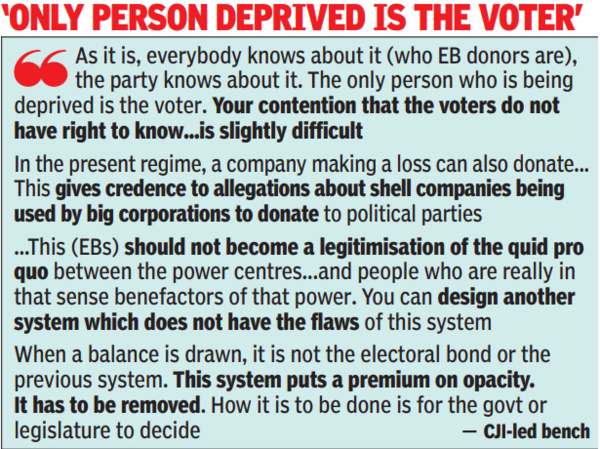Context
-
A five-judge bench of the Supreme Court led by Chief Justice of India is expected to hear a batch of petitions challenging the constitutional validity of the Centre’s electoral bonds scheme.
What are electoral bonds?
- First announced during the Union Budget session in 2017, “electoral bonds” are interest-free “bearer instruments”, which means that they are payable to the bearer on demand, similar to a promissory note.
- Essentially, electoral bonds allow Indian citizens or a body incorporated in India to purchase bonds, enabling anonymous donations to political parties.
- Usually sold in denominations ranging from Rs1,000 to Rs1 crore, these bonds can be bought from authorised SBI branches through accounts complying with KYC norms. Following this, the political parties can choose to encash the bonds within 15 days of receiving them and fund their electoral expenses.
- However, they aren’t available for purchase throughout the year and can only be purchased between 10-day windows falling in the months of January, April, July, and October.
- Importantly, electoral bonds can only be used to donate to political parties registered under Section 29A of the Representation of the Peoples Act, 1951, securing at least 1% of the votes polled in the last election to the House of the People or a Legislative Assembly. Section 29A of the RPA deals with the registration of associations and bodies as political parties with the Election Commission.
Why were electoral bonds introduced?
- The Centre’s rationale behind introducing the electoral bonds scheme was to “cleanse the system of political funding in the country” and bring about “transparency in electoral funding in India”.
- Consequently, the Finance Act(s) of 2016 and 2017 amended four separate legislations to make way for the electoral bonds scheme, including the Foreign Contribution Regulation Act, 2010; the RPA, 1951; the Income Tax Act, 1961; and the Companies Act, 2013.
What has the ECI’s stance been?
- In its submission to the Standing Committee on Personnel, Public Grievances, Law, and Justice in May 2017, the ECI objected to the amendments in the RPA exempting political parties from disclosing donations received through electoral bonds while describing the move as a “retrograde step”.
- In a letter written to the Law Ministry the same month, the Commission even asked the government to “reconsider” and “modify” the above amendment.
What has the Centre’s stance been?
- Attorney General told the Supreme Court, by way of written submissions, that the citizens’ right to know is subject to reasonable restrictions.
- Stating that “there can be no general right to know anything” without “reasonable restrictions”, the AG responded to the petitioner’s prayer for a “declaration that citizens have a right to know as an aspect/facet of the right to freedom of expression,” based on which they have the right to access the details of contributions to political parties.
- Defending the Centre’s scheme, the AG said that it “extends the benefit of confidentiality to the contributor” and promotes the contribution of clean money.
- Adding that the scheme adheres to tax obligations, he said that it doesn’t fall foul of any existing rights.
Source: IE
Visit Abhiyan PEDIA (One of the Most Followed / Recommended) for UPSC Revisions: Click Here
IAS Abhiyan is now on Telegram: Click on the Below link to Join our Channels to stay Updated
IAS Abhiyan Official: Click Here to Join
For UPSC Mains Value Edition (Facts, Quotes, Best Practices, Case Studies): Click Here to Join

